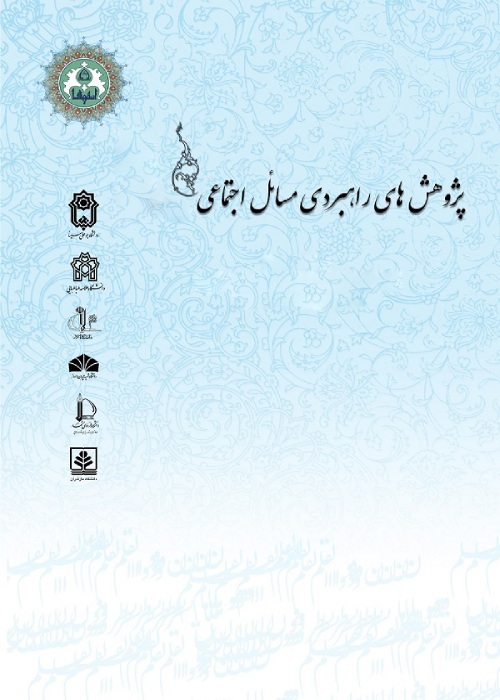Analyzing the Citizens' Lived Experience of Facing the COVID-19 Pandemic in Their Daily Life (Case Study: Isfahan City)
The current era has faced COVID-19 pandemic, also known as the coronavirus pandemic, with novel and far-reaching risks, such as experiencing risky jobs and livelihood situations. Iranian people have also experienced these conditions in a special way in their family, economic, and work conditions and have had different reactions accordingly. The experience of exposure to coronavirus disease (COVID-19) is one of the concepts related to the citizens' lived experiences of social vulnerability in the era of COVID-19. It is very important to examine these experiences because it determines the citizens’ backgrounds and contexts of social vulnerability. After the discovery of the virus in Iran and its spread, each citizen has faced it in a special way and tried to manage it. Although there may be various and sometimes different forms of this encounter, it is possible to extract a common lived experience among the citizens in this field. This research examined their common lived experiences in the face of COVID-19. This study was conducted with the aim of studying and discovering the social activists’ experiences of living with the conditions of the corona crisis and providing a thick description of their experiences. The main questions addressed in this study were as follows: "What were the citizens' lived experiences during the COVID-19 pandemic? What understanding and interpretation did the citizens have about facing the COVID-19 pandemic? What strategies had citizens used to deal with and face the COVID-19 pandemic? And how had they adapted themselves to these conditions?
The qualitative method of "phenomenology" was used in this study and an in-depth semi-structured interview was used to collect the data. The city of Isfahan was studied as the research field. In this study, the statistical population included all the young and middle-aged people, both men and women, who were preferably born in the city of Isfahan or had lived in this city for at least 20 years. 30 citizens were selected by using purposive sampling for the in-depth semi-structured interviews. The data were analyzed by using Colaizzi's 7-step method (1978). This analysis was done to reach descriptive, interpretative, and explanatory codes.
According to the participants, the spread of the coronavirus had suspended parts of social life and intensified the panic in the layers of the activists' minds. The crisis caused by the corona had been so widespread that a form of public panic and general fear had been formed in the society and challenged the citizens’ initial contacts. Part of this public fear originated from the ambiguity and mystery of Corona. Therefore, it could be claimed that its spread, like any other crisis, had caused a change in fundamental attitudes towards oneself, others, and the world. The participants of this research believed that Corona had reminded them of their vulnerabilities more than ever and in this way increased the media, as well as their economic and social fears. How do citizens try to manage their fears and anxieties in the face of COVID-19? Coping shows the state of social, cognitive, and emotional actions of a person in facing stressful elements and the resulting consequences. According to the analysis of the citizens' lived experiences, they used various techniques to deal with Covid-19 and manage their exposures to this disease.These techniques included compliance with medical instructions, observance of health protocols, and "coronavirus protocol". It can be accompanied by "Normalization of COVID-19" or "Religionization of Exposure to COVID-19" for some citizens. The people had to know that they were forced to cope with the corona situation.This result was consistent with the theory of Elrich Beck (1992) and Anthony Giddens (2015). The spread of corona virus was considered as a global risk and one of the consequences of modernity. It had certain psychological and sociological effects. The common concepts of safety and security are degraded from a sociological point of view and anxiety and insecurity become a complete part of modern conditions from the psychological point of view. In fact, according to the results of the research on the spread of the coronavirus, a high-risk society leads to the creation of a vulnerable society.
- حق عضویت دریافتی صرف حمایت از نشریات عضو و نگهداری، تکمیل و توسعه مگیران میشود.
- پرداخت حق اشتراک و دانلود مقالات اجازه بازنشر آن در سایر رسانههای چاپی و دیجیتال را به کاربر نمیدهد.



